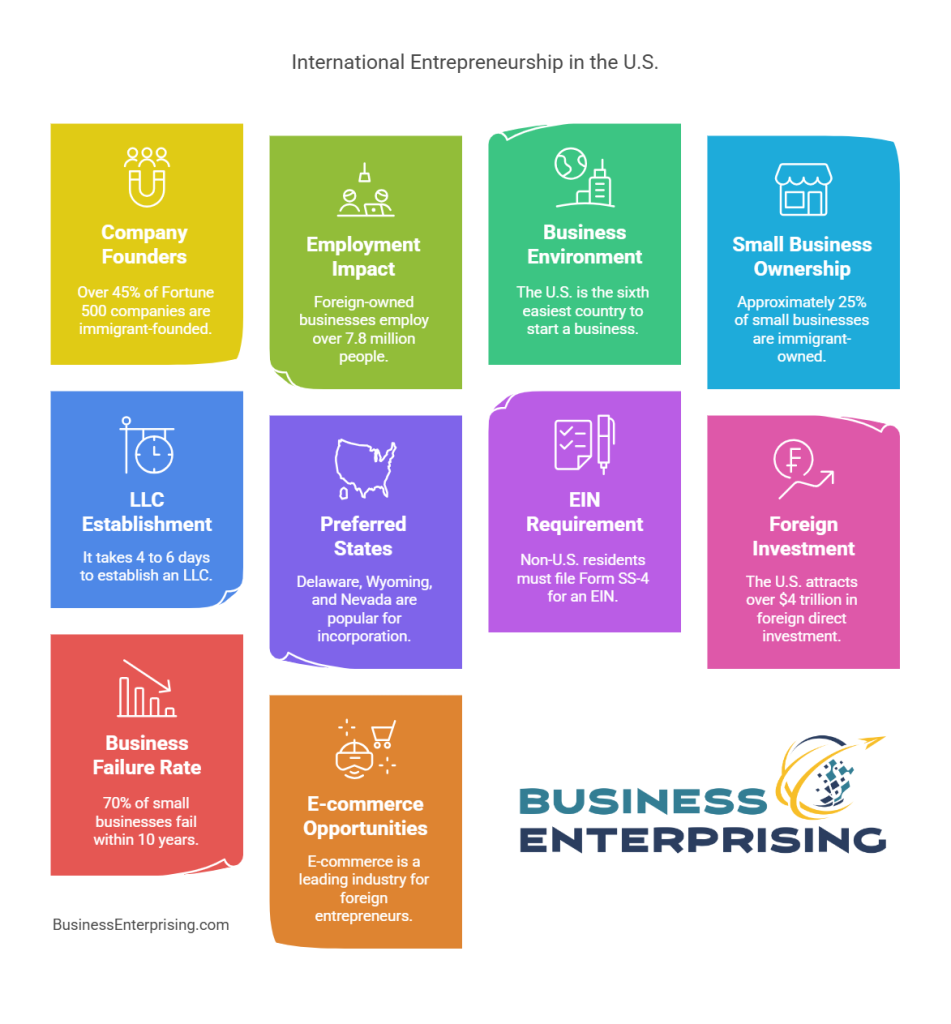
Additionally, addressing key areas like business structure, tax obligations, and market selection helps you align your efforts with your goals. These decisions impact not only your operations but also your ability to connect with your target audience. Therefore, researching and planning each step thoroughly can make a significant difference.
Starting a business in the U.S. may seem complex, but with the right approach, it becomes manageable. By taking the time to learn about the process, you position your business for success in a competitive market. Thoughtful planning helps you seize opportunities while avoiding common challenges.
Understanding Legal and Regulatory Requirements for Foreign Entrepreneurs
Understanding the legal and regulatory requirements is a key step when establishing a business in the U.S. As a foreign entrepreneur, you must comply with federal, state, and local laws. These regulations vary depending on your industry, business structure, and location.
One of the first things to consider is obtaining the appropriate visa. If you plan to operate the business in the U.S., you need a visa that permits business activities. However, there are several visa types to choose from, so selecting the right one depends on your business plans. Additionally, consulting with an immigration attorney can help you avoid unnecessary delays.
Permits and licenses are another important aspect to address. Certain industries require specific permits to operate legally. For example, businesses dealing with food, health, or transportation may need special permissions. Therefore, researching your industry’s requirements early on can save time.
Another factor to consider is choosing a legal business structure. You can register your business as an LLC, corporation, or partnership. Each structure offers different advantages, but it’s important to align the choice with your goals. Additionally, your chosen structure will impact tax obligations and liability.
By understanding these requirements, you can confidently move forward with establishing a business in the U.S. Proper preparation ensures your business meets legal standards and operates smoothly from the start.
Choosing the Right Business Structure for Your U.S. Operation
Choosing the right business structure is a key step when establishing a business in the U.S. Your choice impacts taxes, liability, and operational flexibility. The most common options include LLCs, corporations, and partnerships, each offering unique benefits depending on your goals.
LLCs are popular due to their flexibility and simplicity. They protect your personal assets while offering fewer formalities compared to corporations. Additionally, LLCs allow profits to pass directly to owners, avoiding double taxation. However, depending on your business needs, other structures might be more appropriate.
Corporations are more complex but provide significant benefits for larger businesses. They offer strong liability protection and make raising capital easier. Furthermore, corporations are ideal if you plan to attract investors or issue shares. However, this structure involves more paperwork and stricter regulations.
Partnerships are another option, especially for businesses with multiple owners. They allow shared responsibility and provide a straightforward structure for operations. However, partnerships do not always shield personal assets, so you must weigh the risks. Additionally, partnerships often require clear agreements to avoid disputes.
When selecting a structure, consider your long-term goals and operational needs. Consulting a legal or financial expert can also provide clarity. With the right structure, you set a strong foundation for establishing a business in the U.S. that meets your specific requirements.
Navigating Tax Obligations as a Non-U.S. Resident
Navigating tax obligations as a non-U.S. resident is a critical part of establishing a business in the U.S. Federal, state, and local taxes vary widely and depend on your business structure and location. Understanding these requirements early can help you avoid penalties and keep your operations compliant.
At the federal level, most businesses must pay income taxes. Additionally, non-U.S. residents may be subject to withholding taxes on certain types of income. However, tax treaties between the U.S. and your home country may reduce your liability. Consulting a tax professional familiar with international laws can help you determine your obligations.
State taxes depend on where your business operates. Some states impose income taxes, while others focus on sales and use taxes. Additionally, local governments may charge taxes based on specific activities or services. Researching these requirements beforehand helps you plan your finances effectively.
Complying with U.S. tax laws also involves filing the correct forms. Businesses must keep accurate records and report income to the IRS and state tax authorities. However, navigating these forms can be complex, especially if you’re unfamiliar with the system. Seeking professional guidance ensures you meet your obligations accurately and on time.
By understanding your tax responsibilities, you set a solid foundation for your business. Proper planning allows you to focus on growth while maintaining compliance with U.S. regulations. As a foreign entrepreneur, addressing taxes early simplifies the process and keeps your business on track.
Setting Up a U.S. Business Bank Account
Setting up a U.S. business bank account is an important step when establishing a business in the U.S. A dedicated account separates your personal and business finances, making transactions and financial management easier. Additionally, having a U.S. bank account helps build trust with customers and vendors.
To open a business bank account, you need specific documents. Most banks require your business formation documents, tax identification number, and proof of identity. However, requirements may vary depending on the bank and the state where you are operating. Preparing these documents in advance can help speed up the process.
Additionally, some banks may require a U.S. address for correspondence. If you don’t have a physical location, consider using a registered agent service. When selecting a bank, compare fees, services, and account features to find the best fit for your business. A reliable bank partner can simplify financial operations as you grow.
Having a U.S. business bank account is essential for accepting payments, paying suppliers, and managing expenses. It also helps you establish a financial history, which is important if you need credit in the future. By opening an account early, you set the foundation for smooth operations in the U.S. market.
Finding the Right Market and Location for Your Business
Finding the right market and location is essential when establishing a business in the U.S. Conducting thorough market research helps you understand your target audience and their needs. Additionally, analyzing industry trends and competition gives you insights into areas with high demand for your products or services.
Selecting the right location depends on several factors, including your business model and operational requirements. If your business relies on foot traffic, choosing a location with high visibility and accessibility is important. However, for online-focused businesses, proximity to suppliers or shipping hubs may be more relevant. Additionally, researching local demographics ensures your location aligns with your target market.
When evaluating potential locations, consider costs such as rent, utilities, and taxes. These expenses can vary significantly by state or city. Additionally, some areas may offer incentives or support programs for new businesses, which can reduce initial costs. Balancing affordability with access to your market is key to long-term success.
By carefully researching your market and location, you set a strong foundation for your business. The right choice allows you to connect with your audience and operate efficiently. With a well-informed approach, your business is better positioned to grow and thrive in the U.S. market.
Leveraging Professional Services for a Smooth Transition
Leveraging professional services can make establishing a business in the U.S. a much smoother process. Lawyers, accountants, and consultants provide essential expertise to help you navigate complex regulations and requirements. Their guidance ensures you meet legal obligations and avoid common mistakes that could disrupt your operations.
Lawyers play a key role in setting up your business structure, reviewing contracts, and addressing legal compliance. They help you understand U.S. laws and protect your interests. Additionally, legal professionals can assist with visas and immigration-related matters if you plan to operate your business in the U.S.
Accountants are equally important for managing your finances. They help you understand tax obligations, prepare financial statements, and maintain accurate records. Additionally, accountants can identify cost-saving opportunities and help you plan for long-term financial stability. Their expertise ensures your business remains compliant with U.S. tax laws.
Consultants provide valuable advice tailored to your industry and goals. They help you create efficient workflows, choose the right tools, and optimize your operations. Additionally, consultants bring objective insights that help you make informed decisions during critical stages of growth.
By working with these professionals, you gain the support needed to build a strong foundation for your business. Their expertise reduces uncertainty and allows you to focus on growing your business with confidence. Leveraging professional services ensures a seamless transition as you establish your presence in the U.S. market.
Conclusion
Establishing a business in the U.S. presents exciting opportunities, but it also requires careful planning and a clear understanding of the process. By addressing legal requirements, choosing the right structure, and navigating tax obligations, you set your business up for success. Each step is essential to building a solid foundation.
Additionally, selecting the right market and leveraging professional services further strengthens your chances of achieving your goals. These actions ensure you operate efficiently while avoiding unnecessary challenges. Taking the time to research and seek expert guidance simplifies the process and helps you focus on growth.
With the right approach, starting a business in the U.S. becomes a manageable and rewarding experience. By being informed and proactive, you position your business to thrive in a competitive and dynamic market. Success begins with thoughtful preparation and smart decisions that align with your objectives.



